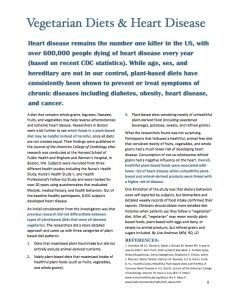Vegetarian Eating Patterns and Heart Disease
Heart disease remains the number one killer in the US, with over 600,000 people dying of heart disease every year (based on recent CDC statistics). While age, sex, and hereditary are not in our control, plant-based diets have consistently been shown to prevent or treat symptoms of chronic diseases including diabetes, obesity, heart disease, and cancer.A diet that contains whole grains, legumes, flaxseed, fruits, and vegetables may help reverse atherosclerosis and ischemic heart disease. Researchers in Boston went a bit further to see which foods in a plant-based diet may be helpful instead of harmful, since all diets are not created equal. Their findings were published in the Journal of the American College of Cardiology after research was conducted at the Harvard School of Public Health and Brigham and Women's Hospital, in Boston, MA. Subjects were recruited from three different health studies including the Nurse’s Health Study, Nurse’s Health Study II, and Health Professional’s Follow-Up Study and were tracked for over 20 years using questionnaires that evaluated lifestyle, medical history, and health behaviors. Out of the baseline healthy participants, 8,631 subjects developed heart disease.An initial consideration from the investigators was that previous research did not differentiate between types of plant-based diets that were all deemed vegetarian. The researchers did a more detailed approach and came up with three categories of plant-based diet patterns:
- Diets that maximized plant food intake but did not entirely exclude animal-derived nutrients.
- Solely plant-based diets that maximized intake of healthful plant foods (such as fruits, vegetables, and whole grains).
- Plant-based diets consisting mostly of unhealthful plant-derived food (including sweetened beverages, potatoes, sweets, and refined grains).
What the researchers found was not surprising. Participants that followed a healthful, animal-free diet that consisted mostly of fruits, vegetables, and whole grains had a much lower risk of developing heart disease. Consumption of not-so-wholesome refined grains had a negative influence on the heart. Overall, healthful plant-based foods were associated with lower risk of heart disease while unhealthful plant-based and animal-derived products were linked with a higher risk of disease.One limitation of the study was that dietary behaviors were self-reported by subjects, but biomarkers and detailed weekly records of food intake confirmed their reports. Clinicians should obtain more detailed diet histories when patients say they follow a “vegetarian” diet. After all, “vegetarian” may mean mostly plant-based foods, plant-based with eggs and dairy, or simply no animal products, but refined grains and sugars included.By Lisa Andrews MEd, RD, LDREFERENCES:1. Esselstyn CB Jr1, Gendy G, Doyle J, Golubic M, Roizen MF. A way to reverse CAD? J Fam Pract. 2014 Jul;63(7):356-364b.2. Ambika Satija, Shilpa Bhupathiraju, Donna Spiegelman, Stephanie E. Chiuve, JoAnn E. Manson, Walter Willett, Kathryn M. Rexrode, Eric B. Rimm, Frank B. Hu. Healthful and Unhealthful Plant-Based Diets and the Risk of Coronary Heart Disease in U.S. Adults. Journal of the American College of Cardiology. Volume 70, Issue 4, July 20173. http://www.nurseshealthstudy.org/about-nhs4. https://www.hsph.harvard.edu/hpfs/hpfs_about.htmPDF Handout: